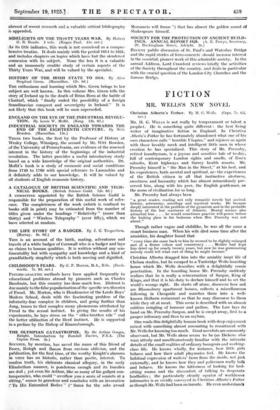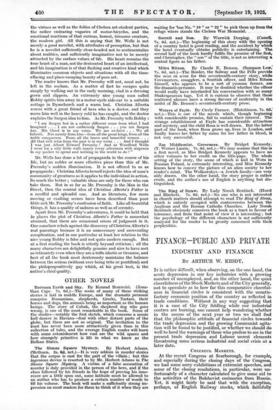FICTION
AIR. WELLS'S NEW NOVEL
Christina Alberta's Father. By H. G. Wells. (Cape. 7s. 6d.
net.)
Mn. H. G. WELLS is not really by temperament or talent a prophet. He is something quite different : the best living writer of imaginative fiction in England. In Christina Alberta's Father he has fortunately abandoned what one of his own characters calls " horrible Utopias," and rejoices us again with those lovably meek and intelligent little men in whose creation he has specialized. This story of Mr. Preemby, retired laundryman, is a joyous and sensitive tale of to-day, full of contemporary London sights and smells, of Essex suburbs, Kent highways and Surrey health resorts. Mr. Preemby himself is " the Man in the Street," at his best, and his experiences, both mental and spiritual, arc the experiences of the British citizen in all that instinctive alertness, sweetness and humanity which has almost miraculously pre- served him, along with his peer, the English gentleman, as the norm of civilization for so long. Mr. Preemby had always been
" a great reader, reading not only romantic novels but ancient history, astronomy, astrology and mystical works. He became deeply interested in the problem of the pyramids and in the probable history of the lost continent of Atlantis. Mental science also attracted him . . . he would sometimes practise will-power before the looking glass in his bedroom when Mrs. Preemby was not about."
Though rather vague and childlike, he was all the same a smart business man. When his wife died some time after the armistice, his daughter found that
" every time she came back to him he seemed to be slightly enlarged and of a firmer colour and consistency . . . Mother had kept him dried up for nearly twenty years, but now he was germinating nobody couldtell what sort of thing he might become.'
Christina Alberta dragged him into the amiably inept life of Chelsea studios, but he escaped to a Tunbridge Wells boarding house which Mr. Wells describes with a delightfully comic penetration. In the boarding house Mr. Preemby suddenly realizes that he is really a reincarnation of Sargon, King of Kings, and that it is his duty to declare himself and to set the world's wrongs right. He starts off alone, discovers how sad are Bloomsbury apartment houses, collects a miscellaneous following in Cheapside and marches them into a well- known Holborn restaurant so that he may discourse to them while they sit at meat. This scene is described with an almost sublime mingling of humour and pathos. The Law lays its hand on Mr. Preemby-Sargon, and he is swept away, first to a pauper infirmary and then to an asylum.
One reads this delightfully human book with deep enjoyment mixed with something almost amounting to resentment with Mr. Wells for knowing too much. Good novelists are commonly observant, but Mr. Wells alone seems to be (as Dickens also was) utterly and unselfconsciously familiar with the intimate details of the small realities of ordinary bourgeois and working- class life. He knows wholly, for instance, how little girls behave and how their adult playmates feel. He knows the habitual expression of waiters' faces from the inside, not just externally, and he knows how they and policemen really talk and behave. He knows the bitterness of looking for bed. sitting rooms and the discomfort of talking to desperate landladies ; the particularly cleanly squalor of workhouse infirmaries is as vividly conveyed in Christina Alberta's Father as though Mr. Wells had been an inmate. He even understand" the virtues as well as the follies of Chelsea art-student parties, the rather endearing vagaries of motor-bicycles, and the emotional-reactions of that curious, honest, tiresome creature, the modem girl. All this is saying that Mr. Wells is not merely a good novelist, with attributes of perception, but that he is a novelist sufficiently clear-headed not to sentimentalize about realities, and sufficiently imaginative not to be merely attracted by the surface values of life. His heart remains the true heart of a man, not the desiccated heart of an intellectual, and his imagination is of that flashing and creative kind which illuminates common vbjects and situations with all the time- effacing and place-escaping beauty of pure art.
The reader knows that Mr. Preemby will not, must not, be left in the asylum. As a matter of fact he escapes quite simply by walking out in the early morning, clad in a dressing gown and slippers. An extremely nice young man called Bobby spirits him away in a motor-cycle side-car to a suitable cottage in Dymchurch and a warm bed. Christina Alberta comes with a great friend of hers who is a doctor, and they nurse him well in the heavy cold he has caught, and the doctor explains the Sargon idea to him. As Mr. Preemby tells Bobby :
" I am Sargon but in a rather different sense from what I had imagined . . . I am not exclusively Sargon . . . you are Sargon too. His blood is in our veins. We are co-heirs . . . We all inherit. Not merely from him—from all the great kings, from all the noble conquerors. From all the brave and beautiful women . . . All that rich wine from the past is in my veins . . . And I thought I was just Albert Edward Preemby ! And at Woodford Wells I went for a silly little walk nearly every afternoon with sixpence in my pocket to spend and nothing in the world to do ! "
Mr. Wells has done a lot of propaganda in the course of his life, but no nobler or more effective piece than this of Mr.
Preemby's sudden illumination. It is not offered to us as propaganda ; Christina Alberta herself rejects the idea of man's community of greatness as it applies to the individual in action. So much the better ; valuable ideas are only for those who can take them. But in so far as Mr. Preemby is the -Man in the
Street, then the central idea of Christina Alberta's Father is a needful and splendid one. And as literature, few more moving or exalting scenes have been described than poor little sick Mr. Preemby's confession of faith Like all beautiful things, it has a quality of sadness as well as of serenity.
Apart from Mr. Preemby's adventures, it could be held that in places the plot of Christina Alberta's Father is somewhat strained, that there are occasional errors of judgment in it. One somehow rebels against the discovery of Christina Alberta's real parentage because it is an unnecessary and unrevealing complication, and in one particular at least her relation to the nice young Bobby is false and not quite modem enough. But at a first reading the book is utterly beyond criticism ; all the many characters are delightfully genuine and nice to have met so intimately even when they are a trifle idiotic or tiresome, and
best of all the book most dexterously maintains the balance between the serious (without ever being trite or pontifical) and the philoprogenitively gay which, at his great best, is the author's chief quality.











































 Previous page
Previous page